🎗️Lonny's War Update- October 640, 2023 - July 7, 2025 🎗️
🎗️Day 640 that 50 of our hostages are still in Hamas captivity🎗️
- The Trump-Netanyahu Meeting
**There is nothing more important than getting them home! NOTHING!**
“I’ve never met them,But I miss them. I’ve never met them,but I think of them every second. I’ve never met them,but they are my family. BRING THEM HOME NOW!!!”
There is no victory until all of the hostages are home!אין נצחון עד שכל החטופים בבית
Red Alerts - Missile, Rocket, Drone (UAV - unmanned aerial vehicles), and Terror Attacks and Death Announcements
*9:00pm- Gaza envelope- rockets from Gaza- Nirim - Air Force says rocket fired from Gaza earlier this evening wasn’t intercepted due to human error
The Israeli Air Force says it conducted a preliminary investigation into the mortar shell that fell in the Nirim area earlier this evening. The findings revealed that the shell was not intercepted due to human error.
The IDF says that lessons have been drawn from the incident and corrective measures are already being put into action.
*3:45am - Jersualem areas, Dead Sea area, parts of West Bank - 2 ballistic missiles from Yemen following major attacks on targets including ports in Houthis controlled Yemen. At least one was intercepted.
The important talks today are those that will take place in the Oval Office today between Trump and Netanyahu, not the proximity talks in Doha. If Trump stands behind what he has been writing in social media and his short comments to journalists, he will tell Netanyahu that the war in Gaza must end now and all the hostages must come home. If this is in fact Trump’s position, then he also has to tell Witkoff and Bahbah that there is no point in having the deal which calls for a 60-day ceasefire and returns only half of the hostages. The war must end completely within two weeks – that is the maximum time needed for the Israeli army to withdraw from Gaza and to redeploy on the Israel-Gaza border. In two weeks, all of the hostages must be released – if needed in two phases – not more. First the living and then the bodies of those who did not survive. During the two weeks, the agreed to number and names of Palestinian prisoners can be released. President Trump can guarantee the entire deal by stating the following: The United States guarantees that the war is over and the fighting will not be renewed, including the withdrawal of Israeli troops to the agreed demarcation points, as long as Hamas does not try to rearm and reorganize to take control over Gaza. The United States will work with the Palestinian leadership and the Arab states to determine the immediate governance structure for Gaza until the Palestinians are able to conduct national elections. The temporary Palestinian-Gazan government must be appointed immediately by President Abbas and empowered to take control over Gaza. They must be credible, non-corrupt, respected Palestinians who would be accepted by the majority of Gazans. The United States calls on the Arab nations to play a positive role by sending a temporary Arab-led force to Gaza to work with the temporary Palestinian-Gazan government to establish law and order. The United States calls on Hamas to turn over its weapons to the security force of the temporary Palestinian-Gazan government. The United States will guarantee the safe passage of those Hamas personnel who would like to safely exit Gaza with their families.
A RECAP:
This is the best possible scenario for ending this horrible war. We have all experienced so much pain and trauma, that the healing process will take a very long time. That process begins with the ending of the war and the killing, the return of hostages, a massive amount of humanitarian aid entering Gaza after an international security mechanism checks it, the establishment of a temporary Palestinian-Gazan government, the deployment of a temporary Arab-led force in Gaza. This must happen with the launching of a serious and committed international effort to advance the implementation of the two-states solution which can be led by the Franco-Saudi initiative in the framework of the Global Alliance for the Implementation of the Two States Solution. And hopefully – the fall of the Netanyahu government and new elections in Israel.
(Gershon Baskin, July 7, 2025, Co-Head of the Alliance for Two States)
- This is the team that will go to Qatar, but sources say no deal likely announced during Netanyahu's US visit
Despite the negotiator's departure for Doha, it appears that Hamas' demands for a revision of the Qatari ceasefire outline will not allow for an agreement in the coming days; Trump may be content with an optimistic statement about rapprochement between the parties; Meeting with Netanyahu upgraded to dinner full article Netanyahu is afraid of a coalition crisis happening before he is ready to go to early elections and therefore is hopeful that Trump will 'grant' him the delays of this first 60 day 5 phase agreement (which is a horrible and inhumane agreement) and that to be followed with another phased agreement which will lead to the end of the war. In addition, Trump is hot to make an announcement already on Monday with Netanyahu that the agreement is going to happen. Netanyahu is going to want him to wait on a statement like that and make it a more vanilla statement that negotiations are underway and a deal will be reached. We will have to see what Trump is willing to do. First round of indirect Hamas-Israel talks in Qatar end inconclusively, say sources
The first session of indirect Hamas-Israel ceasefire talks in Qatar end inconclusively, two Palestinian sources familiar with the matter tell Reuters early Monday.
“After the first session of indirect negotiations in Doha, the Israeli delegation is not sufficiently authorized and is not authorized to reach an agreement with Hamas, as it has no real powers,” the sources tell Reuters.
Prime Minister Benjamin Netanyahu, who is currently on his way to Washington to meet with US President Donald Trump, said late Saturday night that Hamas’s latest demands were not acceptable to Israel, but that he was nevertheless dispatching a high-level negotiating team to Doha.
The sources claim that the Israeli delegation does not have a sufficient mandate to reach an agreement with Hamas.- Trump: ‘Good chance’ of deal this week that would see ‘quite a few hostages’ released - this statement of Trump's is very bad. It means that after saying for the last week that he wanted the war to end, Netanyahu got to him and already convinced him that the ending of the war will not be in the immediate and to give Netanyahu his time to run the negotiations according to his plan and timetable which will run 3-4 months, at least. Extremely bad news for the hostages, their families and the country.
Netanyahu said to receive report on medical conditions of all living hostages
With 10 of 20 living captives set to go free under potential deal, TV report provides excerpts from medical files shown to PM; ministers reportedly say all are ‘humanitarian’ cases. Just before Prime Minister Benjamin Netanyahu departed for Washington on Sunday to meet with US President Donald Trump, he was reportedly presented information about the medical condition of each of the 20 remaining living hostages, which is said to serve as the basis of who will be chosen to be freed during the hostage-ceasefire deal that is seen to be nearing agreement.
The medical information given to Netanyahu and some senior ministers and aides will be used in discussions, both internal and with mediators, about which hostages’ releases will be prioritized, Channel 12 reported on Sunday.
According to the report, senior cabinet ministers said after the information was presented that “we will have difficulty prioritizing [the hostages],” because “they are all humanitarian [cases].”
The outline of the deal, as it currently stands, would see about half of the living hostages and about half of the dead hostages held by terror groups in Gaza returned to Israel over 60 days, in five separate releases.
Eight living hostages would be freed on the first day and two released on the 50th day, according to an Arab diplomat from one of the mediating countries. Five slain hostages would be returned on the seventh day, five more on the 30th day and eight more on the 60th day. That would leave 22 hostages still held in Gaza, 10 of them believed by Israeli authorities to be alive.
The deal has yet to be finalized, and there has been no definitive statement on whether Israel or Hamas would be the one to determine which 10 of the 20 living hostages would be freed under its terms, and according to which criteria.
As part of the outlet’s report, Channel 12 shared excerpts from the medical files of each living hostage, to highlight the difficulty in deciding between them based on medical priority.
According to the report,
Alon Ohel, 24, who is held captive alone, is in a condition that puts him “at high risk” for blindness.Yosef-Haim Ohana, 24, is suffering from severe mental illness.
Avinatan Or, 32, is facing a severe shortage of food and water.
Matan Angrest, 21, was severely abused during captivity and could face permanent disability.
Elkana Bohbot, 36, faces severe mental health issues that have not been treated.
Gali and Ziv Berman, both 27, are both thought to be suffering from mental and physical illnesses.
Rom Braslavski, 21, suffers from asthma and is wounded in both arms.
Guy Gilboa-Dalal, 22, and Evyatar David, 23, who are thought to be held together, have faced extreme abuse and severe hunger.
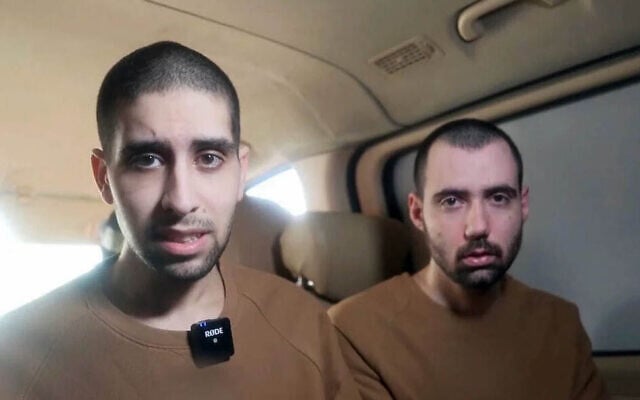 Hostages Evyatar David (left) and Guy Gilboa-Dalal speak in a Hamas propaganda video filmed at the site and time of the release ceremony in Gaza for three other captives, February 22, 2025. (Screenshot: Telegram)
Hostages Evyatar David (left) and Guy Gilboa-Dalal speak in a Hamas propaganda video filmed at the site and time of the release ceremony in Gaza for three other captives, February 22, 2025. (Screenshot: Telegram)Eitan Horn, 37, suffers from a chronic illness that has not been treated.
Maxim Herkin, 36, has an injured arm. Nimrod Cohen, 20, has faced severe interrogations by his captors.
Segev Kalfon, 27, suffers from post-traumatic stress disorder and a “deteriorating” mental condition.
Bar Kuperstein, 23, faces serious malnourishment and other health issues.
Ariel and David Cunio, 26 and 34, are both thought to have been held in harsh conditions, and there is a lack of information about their conditions.
Omri Miran, 46, suffers from malnourishment and has been held in isolation.
Eitan Mor, 23, is held in harsh conditions and there is serious concern for his health.
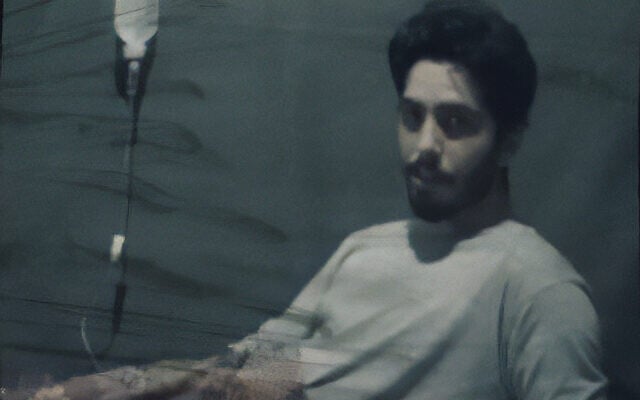 An image released by the Hamas terror group on June 7, 2025, shows Israeli hostage Matan Zangauker. (Used in accordance with article 27a of the Copyright Law.)
An image released by the Hamas terror group on June 7, 2025, shows Israeli hostage Matan Zangauker. (Used in accordance with article 27a of the Copyright Law.)Matan Zangauker, 25, is held in isolation and suffers from muscular dystrophy.
In addition, there is “serious concern” for the lives of Tamir Nimrodi and Bipin Joshi, due to a lack of any signs of life since they were captured.
Unlike in the previous ceasefire-hostage release deals, according to Channel 12, the same authorities that presented the medical information of the hostages to the cabinet did not rank them in terms of medical priority; instead, they left that choice up to the political decision-makers.
According to the report, the meeting ended without a decision on who would be prioritized, and that decision will be made when talks begin on the deal’s implementation.
Israel dispatched a team of negotiators to Doha on Sunday after Hamas said Friday that it had responded positively to a US- and Israel-backed proposal. The first round of indirect talks was said to end inconclusively late Sunday night.
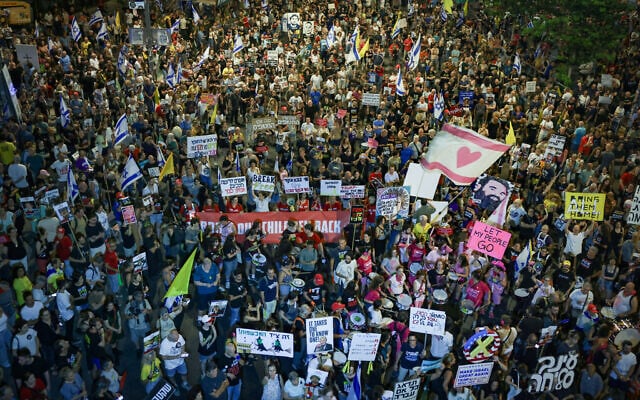 Anti-government, pro-hostage deal protesters rally outside the IDF headquarters in Tel Aviv, July 5, 2025. (Miriam Alster/Flash90)
Anti-government, pro-hostage deal protesters rally outside the IDF headquarters in Tel Aviv, July 5, 2025. (Miriam Alster/Flash90)Also on Sunday, Idit Ohel, the mother of hostage Alon Ohel, told Channel 12 in an interview that the thought that one hostage being on the list of release means that another will have to stay behind is “extremely difficult.”
The interview was aired from Washington, where Ohel traveled ahead of the premier’s visit, to “look decision-makers in the eye.”
Her son is held alone in harsh conditions, she said, and is severely injured in his eye, adding that she needs to “take this information in without the ability to do anything about it.”
“I can’t help him, I can’t give him food,” she said, tearing up. “I can’t come and hug him, nothing.”
“The time has come” for an agreement, she said. “Alon needs to come home.”
 Idit Ohel, mother of hostage Alon Ohel, speaks during a rally calling for the release of Israelis held hostage by Hamas terrorists in Gaza, at Hostage Square in Tel Aviv, March 8, 2025. (Avshalom Sassoni/Flash90)
Idit Ohel, mother of hostage Alon Ohel, speaks during a rally calling for the release of Israelis held hostage by Hamas terrorists in Gaza, at Hostage Square in Tel Aviv, March 8, 2025. (Avshalom Sassoni/Flash90)The Hostages and Missing Families Forum on Saturday criticized the partial deal, saying “we should not conform to the various ‘Schindler’s lists’ being dictated,” in reference to the roughly 1,200 Jews who survived the Holocaust by being chosen to work in Oskar Schindler’s factory. In a statement, the forum said it had been “possible to bring them all back long ago.”
The Forum added that the method of releasing hostages via selective lists and in phases creates “unbearable uncertainty” for the families.
“All of the hostages could have been returned for rehabilitation and burial many months ago, if only the government had chosen to do so rather than operate based on considerations of political survival,” it added.
Hostage families have previously compared partial deals to the Nazi “selection” of Jews who arrived at death camps, between those who were sent straight to the gas chambers and those who were kept alive for forced labor.
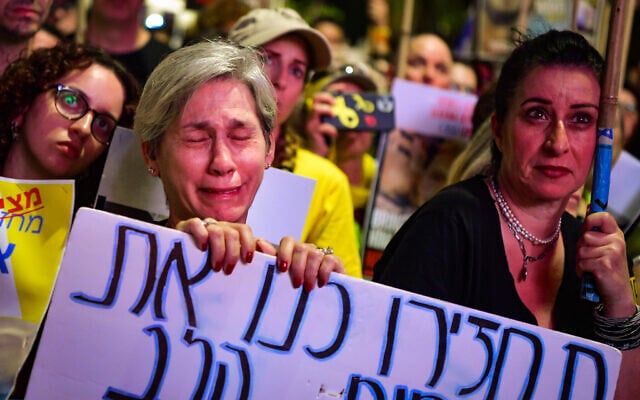 Demonstrators call on the government to strike a deal with the Hamas terror group to secure the release of hostages, at Hostages Square in Tel Aviv, July 5, 2025. (Avshalom Sassoni/Flash90)
Demonstrators call on the government to strike a deal with the Hamas terror group to secure the release of hostages, at Hostages Square in Tel Aviv, July 5, 2025. (Avshalom Sassoni/Flash90)Terror groups in the Gaza Strip are believed to still be holding 50 hostages, including 49 of the 251 abducted by Hamas-led terrorists on October 7, 2023. These 50 include the bodies of at least 28 confirmed dead by Israel, including an IDF soldier killed in 2014.
Twenty of the hostages are believed by Israeli authorities to be alive, and there are grave concerns for the well-being of two others, Israeli officials have said.
Since the start of the war, Hamas has freed 140 hostages, largely in two ceasefire deals. It also returned the bodies of eight slain hostages earlier this year. Eight hostages have been rescued alive from captivity by troops, and the bodies of 49 have also been recovered from Gaza by Israeli soldiers. link How can there be priorities? Every single one of them is humanitarian and that is the reason that both the Defense and Health Ministries have refused to take part of prioritizing. Why should there be any lists and selections? This is all Netanyahu concocted inhumane and disgraceful invention to continue his war for political survival!
For Netanyahu, the issue of priority and selection is easy: He is the priority and the selection is whatever is best for him. He has never given a damn about the lives of the hostages and the suffering of the families. Let us all remember his statement from just a few weeks ago. I paraphrase: 'We all have to make personal sacrifices. My family has had to make sacrifices as well. We had to postpone my son's wedding." That is how he prioritizes - his son's wedding postponement equals the death, torture and starvation of the hostages! For a man, whose wife and eldest son, like him are all lacking in any degree of empathy and/or sympathy, the suffering of others means absolutely nothing to them and all of their words of false compassion are no more than that, words that have no meaning. There is no heart or soul in the feelings, the words, the actions and all that matters is Netanyahu's personal political survival. That is the bottom line and has been since October 7.Israel, Hamas said to resume indirect talks in Doha as Netanyahu set to meet Trump at White House
Hamas and Israel were resuming talks in Qatar, an unnamed Palestinian official says, as Prime Minister Benjamin Netanyahu arrives to Washington to meet US President Donald Trump, who has pushed for a “deal this week.”
The latest round of negotiations on the war in Gaza began yesterday in Doha, aiming to broker a ceasefire and reach an agreement on the release of hostages and Palestinian prisoners.
“Indirect negotiations are scheduled to take place before noon today in Doha between the Hamas and Israeli delegations to continue discussions” on the proposal, a Palestinian official familiar with the negotiations tells AFP. There is no official comment from Israel.
Ahead of Netanyahu’s third visit to the White House since Trump’s return to office this year, the US president said there was a “good chance” of reaching an agreement.
“We’ve gotten a lot of the hostages out, but pertaining to the remaining hostages, quite a few of them will be coming out,” he told journalists.
Netanyahu, speaking before taking off for Washington, said his meeting with Trump could “definitely help advance this” deal, but highlighted his opposition to any agreement that would ultimately leave Hamas in power in Gaza.
However, Palestinian sources claimed that the Israeli delegation didn’t have a sufficient mandate to reach an agreement with Hamas.
Terrorists in Gaza are still holding 50 hostages, with 28 of them confirmed dead by the IDF. Twenty of the hostages are believed by Israeli authorities to be alive, and there are grave concerns for the well-being of two others, Israeli officials have said.
Hamas-linked authorities claim that more than 57,000 people have been killed in Gaza since the start of the war, an unverified figure that does not distinguish between civilians and combatants. Israel’s toll in the ground offensive against Hamas in Gaza and in military operations along the border with the Strip stands at 444.
Hundreds gather to mark 27th birthday of slain hostage Guy Illouz
A grieving crowd of hundreds gathers at Tel Aviv’s Hostages Square to mark what would have been the 27th birthday of Guy Illouz, who was kidnapped by Hamas terrorists on October 7 and murdered in captivity. His body still held hostage.
Illouz, who worked in Israel’s music industry as a stagehand, has been mourned by local musicians, including Matti Caspi, Hayehudim, and others.
The rock band, The Giraffes, along with singer-songwriter Hemi Rudner perform in Illouz’s memory
- Iranian ballistic missiles struck five IDF bases during war
Satellite data from US university said to reveal strikes on intelligence base airbase and other facilities; number of successful interceptions decreased daily for first 8 daysIranian ballistic missiles struck five Israeli military bases during the 12-day war with last month, The Telegraph reported on Saturday for the first time, citing satellite data shared by Oregon State University.
Details of strikes on Israel Defense Forces bases and other sensitive locations are prevented from being published in Israel due to military censorship rules, as authorities argue that they could be used by Iran to better calibrate its missiles.
But according to the British news outlet, targeted bases included the Tel Nof airbase, the Glilot intelligence base, and the Zipporit armor and weapons production base.
The report was based on radar data obtained by The Telegraph from Oregon State University, which tracks bomb damage in war zones via satellites.
According to the report, five IDF bases were struck with a total of six rockets during the war between Israel and Iran, launched by Israel on June 13 to dismantle the Islamic Republic’s nuclear and missile programs.
In addition to the six rockets said to have struck military bases, 36 other missiles impacted inside Israel, having evaded interception by Israeli and US air defenses, killing 28 people and damaging 2,305 homes in 240 buildings, along with two universities and a hospital, and leaving over 13,000 Israelis displaced.
Part of a ballistic missile fired from Iran, seen in the West Bank, June 29, 2025. (Chaim Goldberg/Flash90)In total, Iran launched over 500 ballistic missiles at Israel throughout the 12-day war, The Islamic Republic also launched around 1,100 drones, of which only one impacted inside Israel.
While the overall interception success rate was high, the report found that an increasing number of missiles managed to slip through defense systems each day during the first eight days of the war.
All in all, The Telegraph said its data analysis indicated that by day seven of the war, around 16 percent of missiles were slipping through Israeli and US air defense systems.
The reason for the drop in interceptions was unclear, The Telegraph said, but it noted that Israel may have been choosing to save its interceptor missiles for when they were most needed.
The Wall Street Journal had reported during the war that Israel was running low on its Arrow interceptor missiles, and that it would need to start picking and choosing what to intercept and what to let through. The IDF denied the report, however, saying that it had prepared ahead of time with enough to handle the threat.
Another reason suggested by The Telegraph for the decline in interceptions was the type of missiles Iran was choosing to fire. It posited that these may have been more sophisticated, and therefore harder to shoot down.
There was at least one confirmed instance, on June 19, of Iran using a cluster bomb warhead to attack Israel, which dropped around 20 smaller munitions at a radius of around 8 kilometers (5 miles). One of the small munitions, with an explosive warhead of around 2.5 kilograms, struck a home in the central town of Azor, causing damage equivalent to that of a small rocket.View of destruction in the central Israeli city of Bat Yam a few days after it was hit by a ballistic missile fired from Iran into Israel. June 24, 2025. (Chaim Goldberg/FLASH90)
The IDF, when asked by the Telegraph about the reported impacts inside military facilities, said that it would not comment on the matter.
“What we can say is that all relevant units maintained functional continuity throughout the operation,” it said.
Israel said its sweeping assault on Iran’s top military leaders, nuclear scientists, uranium enrichment sites, and ballistic missile program was necessary to prevent the Islamic Republic from realizing its avowed plan to destroy the Jewish state.
Iran has consistently denied seeking to acquire nuclear weapons. However, it enriched uranium to levels that have no peaceful application, obstructed international inspectors from checking its nuclear facilities, and expanded its ballistic missile capabilities. Israel said it had recently taken steps toward weaponization. link - How Iran built a spy ring in Israel and tested its agents' limits
Tehran reportedly tried building spy network in Israel before the war, offering money for minor tasks to groom assassins; one recruit agreed to kill a nuclear scientist; another, an Azerbaijani-Israeli, ran espionage as a 'family business'
Ahead of last month’s launch of Operation Rising Lion and the outbreak of hostilities with Iran, Israeli security forces uncovered a wide-reaching Iranian espionage network that relied on Israeli citizens who provided intelligence to Tehran, the Guardian reported on Sunday.While some cases had already reached the media, the report noted that Israel's defense establishment was surprised by the number of collaborators. According to the Guardian, more than 30 Israelis have been accused of cooperating with Iranian intelligence since Iran's first large-scale missile attack in April 2024. In many of the cases, initial contact reportedly came through anonymous messages offering money in exchange for information or small tasks. Those who agreed were later offered larger sums for more dangerous assignments. Court documents cited in the report indicate that despite the sharp uptick in Iranian espionage efforts, the network achieved limited results and fell short of Tehran’s most ambitious goals, including the assassination of senior Israeli officials. However, dozens of Israelis who agreed to carry out lower-risk missions may have ultimately provided Iran with sensitive information about strategically significant sites, which later became targets for Iran’s ballistic missiles during the war. Filmed a video – and got nearly $1,000 Court documents related to suspects accused of spying for Iran—including one already convicted—shed light on the recruitment and operational methods used by Iranian handlers. Initial contact often came via anonymous text messages. In one instance, an Israeli received a message from a self-described “news agency” asking, “Do you have any information about the war? We are ready to buy it.” Another message, sent to an Arab Israeli on behalf of “Tehran-Quds,” was more direct: “A free Jerusalem unites Muslims. Send us information about the war.” The message included a link to the Telegram app, where further conversations took place, sometimes with an operator using a Hebrew name. These operators offered payments in exchange for simple tasks. If the individual expressed interest in cooperating, the handler instructed them to open a PayPal account and register with an app capable of receiving cryptocurrency payments. One suspect, arrested on September 29 last year, was assigned a first mission to visit a public park and check whether a black bag had been buried at a specific spot—an assignment worth nearly $1,000. No bag was found, and the newly recruited agent sent his handler a video to prove it. Under Iranian instruction, the same operative later distributed flyers, hung posters and spray-painted graffiti critical of Prime Minister Benjamin Netanyahu, including slogans such as “We are all together against Bibi,” (Netanyahu's nickname) or “Bibi brought Hezbollah here” or “Bibi = Hitler.” The Guardian also reported that an Israeli of Azerbaijani descent agreed to photograph sensitive sites across the country, even turning it into a “family business” by recruiting several relatives to help document locations such as the Haifa Port, the Nevatim Airbase in the Negev, Mossad headquarters in Glilot and various Iron Dome batteries.
Agreed to kill nuclear scientist, family and torch their home The same operative recruited to search for a black bag buried in a public park was later instructed by Iranian handlers to photograph the home of a nuclear scientist working at the Weizmann Institute of Science—a site that suffered a direct hit during the war. According to the Guardian, the images provided by Iranian-recruited agents may have enabled Tehran to strike the prominent scientific center successfully, after years in which Iranian nuclear scientists were reportedly assassinated under mysterious circumstances, likely by the Mossad.
The British paper highlighted the stark contrast in methods between Israel’s Mossad and Iran’s Islamic Revolutionary Guard Corps. While Mossad infiltrated highly trained operatives who provided intelligence that led to the targeting of Iran’s top leadership, Iran employed a radically different approach, recruiting random people and testing how far they were willing to go, progressively assigning more dangerous tasks. Once these new agents completed simple assignments—such as taking photos or hanging posters—the Iranian handlers offered them riskier missions for higher compensation. One of those agents, who had photographed the nuclear scientist’s home, was offered $60,000 to murder the scientist and his family and burn down their house. According to the indictment, the agent, a Jewish Israeli, agreed to the plot and hired four local criminals, all Arab Israelis, to carry it out. The group attempted the assassination on September 15 but was unable to enter the Weizmann Institute due to the presence of a security guard. The report said they “meekly drove away.” The Guardian reported that the day after the failed operation, Iranian handlers asked the agent to return to the institute and take additional photos. He complied, entering the premises in broad daylight and photographing the scientist’s car, for which he received $709. He was later asked to plant a GPS tracking device in the vehicle but refused. The paper noted this pattern repeated across multiple indictments: while Iran found Israelis willing to photograph sites and distribute propaganda, it struggled to secure long-term operatives. In some cases, agents were asked—just days after completing their first assignments—whether they would consider assassinating senior Israeli officials. The Azerbaijani-Israeli family network was reportedly asked to locate a hitman for such a mission but declined. The agent who targeted the nuclear scientist was also asked to consider throwing a bomb at Netanyahu’s vehicle. link
Israel says it killed commander of north Gaza naval force in strike on cafe last week
The IDF and Shin Bet announce that they killed Ramzi Ramadan Abd Ali Salah, the commander of Hamas’s naval force in northern Gaza, during an airstrike last Monday in Gaza City.
The military confirms that he was the target of the strike on a cafe, in which Hamas-linked authorities said killed 24 people.
Several other terrorists were also killed in the operation, the military says.
Salah, identified by the IDF as a key figure in Hamas’s maritime capabilities, had been actively planning attacks against Israeli forces operating in the Strip. He was targeted inside a building in Gaza City, where he was meeting with other operatives.
The strike, carried out by an Israeli Air Force jet, was guided by intelligence from the Navy, the Military Intelligence Directorate, and the Shin Bet.
Among the additional Hamas members killed were Hisham Ayman Atiya Mansour, deputy head of a Hamas mortar unit, and Nassim Muhammad Suleiman Abu Sabha, a member of Hamas’s mortar unit.
The IDF claims that several measures were taken to minimize civilian harm, including the use of precision munitions, aerial surveillance, and additional intelligence assessments.
- Senior Hamas official says group’s control over Gaza has ‘completely collapsed’
This picture taken from a position near Israel's border with the Gaza Strip, shows Israeli soldiers and vehicles inside the the besieged territory on July 6, 2025. (Maya Levin / AFP)A senior Hamas official tells the BBC that the terror group has lost control of around 80% of the Gaza Strip and that there is “barely anything left” of its military structure.
The British news outlet says it received a number of voice messages from a “senior officer” in Hamas, identified only as a lieutenant colonel who was wounded in October 2023.
“Let’s be realistic here — there’s barely anything left of the security structure. Most of the leadership, about 95%, are now dead… The active figures have all been killed,” he said. “So really, what’s stopping Israel from continuing this war?”
The official claims that the war “has to continue until the end. All the conditions are aligned: Israel has the upper hand, the world is silent, the Arab regimes are silent, criminal gangs are everywhere, society is collapsing.”
He says since the end of the latest ceasefire in March, Hamas’s security control in Gaza “has completely collapsed. Totally gone. There’s no control anywhere,” pointing to extensive looting of Hamas’s complex with no intervention.
“So, the security situation is zero. Hamas’s control is zero. There’s no leadership, no command, no communication. Salaries are delayed, and when they do arrive, they’re barely usable. Some die just trying to collect them. It’s total collapse.”
- IDF says dozens of targets hit in Gaza strikes; terror infrastructure destroyed in ground ops
Dozens of targets were struck by the Israeli Air Force in the Gaza Strip over the past day, including dozens of operatives, weapon depots, observation posts, and other buildings used by terror groups, the military says in a daily update.
The strikes come as five IDF divisions, made up of tens of thousands of troops, continue to operate across Gaza.
During ground operations, the IDF, says troops killed numerous operatives and destroyed Hamas infrastructure, including tunnels, buildings used for terror, anti-tank launch posts, and observation posts.
- Gaza militia head Abu Shabab in exclusive interview says Hamas is 'vile and despicable' and nearing its endThe Bedouin leader of armed groups fighting Hamas in Gaza says he is cooperating with the Palestinian Authority but not with Israel; provides food aid to Gazans and is wanted by the ruling terror faction for treason and other crimes
"My clan is spread over an area that extends from the Negev to the Sinai. We are a big family and everyone supports me and my actions," said Yasser Abu Shabab in his first interview for an Israeli media outlet.A Bedouin from the Tarabin tribe, Abu Shabab, organized armed groups to fight Hamas in Gaza, reportedly with weapons provided by Israel.Yasser Abu ShababDon’t call us a militia. We are groups fighting terrorism in the Gaza Strip," he says with a smile. Hamas has branded him a traitor. "They call me a criminal, a thief, a member of ISIS, all to frighten people and keep them from contacting me," he said. "But that has not worked. Anyone who kidnaps and kills children, like the Bibas family, has no right to define or judge others. They are subhuman,vile and despicable people and their end is near."
Abu Shabab was living in Sinai and only returned to the Gaza Strip a couple of months before the October 7 massacre. "Hamas planned their attack on the fateful day, and carried out their attacks without any consideration of the miserable people living in Gaza," he said. "We lost everything. We lost our homes, property, jobs and money while they live in their tunnels underground and lack nothing. Is there a wrong greater than that?"
He said he and his family moved from Rafah to the humanitarian zone in al-Mawasi. "We saw a difficult life there with hunger, a lack of basic provisions and humiliation and that is when I contacted the Palestinian Authority that supports me."The first to respond was Mahmoud al-Habbash, an advisor to Palestinian President Mahmoud Abbas. "I could not stand the humiliation of suffering of war, especially after Hamas treated us with suspicion because of our connection to the clan in the Sinai, which opposes the Muslim Brothers," he said. "They murdered 52 people, among them my brother, and we Bedouins have honor. We cannot remain silent after such painful humiliation, so I decided, with the support of the PA, to form the Abu-Shabab group."Soon after moving to the humanitarian safe zone, Abu Shabab said he saw how Hamas was disrupting the distribution of aid. "They took all of it," he said. "I decided this cannot go on and began stopping the aid trucks and taking the food to give to the people. I did this for months. Hamas was after me, but my conscious was clear because I was feeding women and children." Over time, his popularity grew and dozens of young Gazans joined him. "Anyone who had a gun would come and fight alongside us," he said. "Those who hid weapons, handed them over to me and I felt I was on the right track. Hamas became very weak. We see this on the ground. They run like mice when we fight them. They have new recruits, but those are untrained teenagers who are given guns but don't know what to do with them." link. No one should be cheering in the streets thinking that there is a militia that is helping Israel take care of Hamas. We shouldn't idolize this or any other of the Gazan 'Militias'. They are war lords who run family clans that have been involved in criminal activities for years/decades. Many of their members have been perpetrators of terror activities against Israel and our soldiers and their criminal activities have been against their own people as well as against Israelis. Netanyahu is utilizing them now because he has stupidly refused to have any other governing body as an alternative to Hamas. The big problem is here is just like all the big problems that Netanyahu creates. He has no strategic plan for anything other than his own political survival. He starts things like the militias and wars and doesn't consider the implications or price down the road and has no exit strategy for anything. This like everything else he touches, will come back and hurt us big time down the road.
Gaza and the South

- IDF says troops destroyed several Assad regime outposts in Syrian buffer zone
Troops from the IDF’s 810th “Mountains” Regional Brigade, under the command of the 210th Division, continue to carry out targeted operations in southern Syria, the military says.
In one such operation, reserve forces from the 810th Brigade, together with Yahalom combat engineers, destroyed several outposts belonging to the former Assad regime in the Syrian buffer zone.
According to the military, these outposts posed a direct threat to IDF positions in the Mount Hermon area.
The brigade’s forces continue to conduct proactive operations in southern Syria to protect the security of Israeli citizens, and residents of the Golan Heights in particular, the IDF says. video
For 2nd time in days, IDF says troops in south Syria arrested terror cell working on behalf of Iran
For the second time in days, the IDF says it captured a cell of operatives operating on behalf of Iran’s Islamic Revolutionary Guard Corps, during an overnight raid in southern Syria.
Reservists of the Alexandroni Brigade and field interrogators of the Military Intelligence Directorate’s Unit 504 operated overnight in the Kwdana area — close to the border and near an IDF post in southern Syria — to detain the cell, the military says.
Several members of the cell who the IDF says were operating on behalf of the IRGC were nabbed. On Wednesday, several other IRGC-affiliated operatives were captured in a raid in south Syria, according to the military.
Two Palestinians said killed by Israeli fire in village near Nablus; no immediate comment from IDF
The Palestinian Authority health ministry says that two men were shot dead by Israeli forces near the city of Nablus, in the West Bank, earlier today.
Qusai Nasser Mahmud Nassar, 23, and Wissam Ghassan Hassan Shtayyeh, 37, “were shot and killed by the occupation forces on Sunday afternoon in the village of Salem, east of Nablus,” the ministry says in a statement.
According to WAFA, the PA’s official news agency, a 62-year-old man was also injured by the gunfire and was evacuated for medical treatment by the Palestinian Red Crescent.
It says that the Palestinian Red Crescent received Nassar’s body after the incident, but that the IDF has not yet handed over the body of Shtayyeh.
There is no immediate comment from the IDF.
IDF says it struck Hezbollah targets in southern and eastern Lebanon
The IDF says it carried out airstrikes against several Hezbollah targets in southern Lebanon and the Bekaa region of eastern Lebanon a short while ago.
The strikes targeted military sites, infrastructure used for storing and producing strategic weapons, and a rocket launch site belonging to the terror group, it says.
The military says that Hezbollah’s presence and activity in the area constitute a clear violation of the agreements between Israel and Lebanon.
- Politics and the War and General News
Israelis, Jewish groups in US plan protests against Gaza war during Netanyahu visit
Israeli expats and leftist Jewish groups in the US are organizing protests in Washington, DC, and New York, against Prime Minister Benjamin Netanyahu during his visit this week.
The protesters are calling for an end to the war in Gaza, the release of the hostages, and aid for Palestinians. The protests will take place tomorrow morning.
The protest in Washington, DC, will be held near the White House and is backed by groups including T’ruah, J Street, and the Israeli expat group UnXeptable.
“On the same day that Prime Minister Netanyahu will be in Washington to meet with President Trump, we’ll raise our voices and demand action,” a statement from the groups says. “Join us as we rally together for an end to the bloody war in Gaza, for the release of all remaining hostages, and for humanitarian aid to be rushed into Gaza.”
The demonstrators in New York are not part of a formal group, but are an outgrowth of a protest network that took shape in the US prior to the war in Gaza, amid the Netanyahu government’s judicial overhaul efforts.
The New York rally will take place outside the Israeli consulate.
- The Region and the World
Israel carrying out ‘intense’ strikes on Houthi targets in Yemen, confirms defense minister
Israel is currently striking targets in Yemen, Defense Minister Israel Katz confirms, shortly after the IDF issued evacuation orders for certain areas.
“The IDF is currently intensely striking targets of the Houthi’s terror regime in the ports of Hodeidah, Ras Isa, and Salif,” Katz says in a statement, adding that the targets also include a power station and the “Galaxy Leader” ship that the Houthis hijacked and captured two years ago in the Red Sea.
“As I warned, Yemen will be treated like Tehran,” he adds, repeating a threat he made last week. “Anyone who tries to harm Israel will be harmed, anyone who raises a hands against Israel will have it cut off. The Houthis will continue to pay a heavy price for their actions.”
Residents near some of the targets have reported hearing loud explosions.
The strikes come shortly after the IDF issued evacuation warnings for three Houthi-controlled ports and a power plant in Yemen.
The Houthis have continued to fire drones and missiles at Israel even since the ceasefire with Iran went into effect last month.
20 fighter jets dropped 50 munitions on Houthi targets in strikes, says IDF
- Personal Stories
Acronyms and Glossary
ICC - International Criminal Court in the Hague
IJC - International Court of Justice in the Hague
MDA - Magen David Adom - Israel Ambulance Corp
PA - Palestinian Authority - President Mahmud Abbas, aka Abu Mazen
PMO- Prime Minister's Office
UAV - Unmanned Aerial vehicle, Drone. Could be used for surveillance and reconnaissance, or be weaponized with missiles or contain explosives for 'suicide' explosion mission
Join my Whatsapp update group https://chat.whatsapp.com/IQ3OtwE6ydxBeBAxWNziB0
Twitter - @LonnyB58 Bluesky - @lonny-b.bsky.social
My blogs in The Times of Israel my blogs
Twitter - @LonnyB58
My blogs in The Times of Israel my blogs





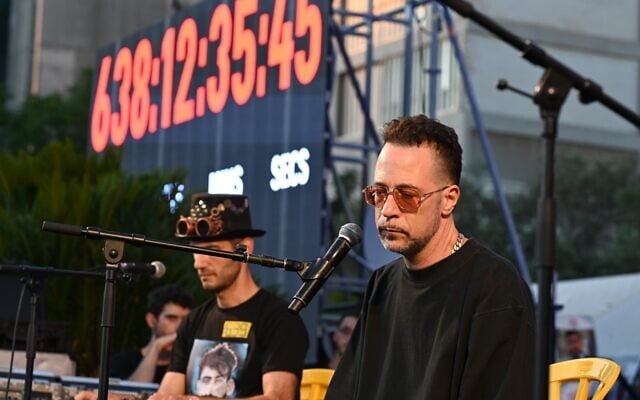











Comments
Post a Comment